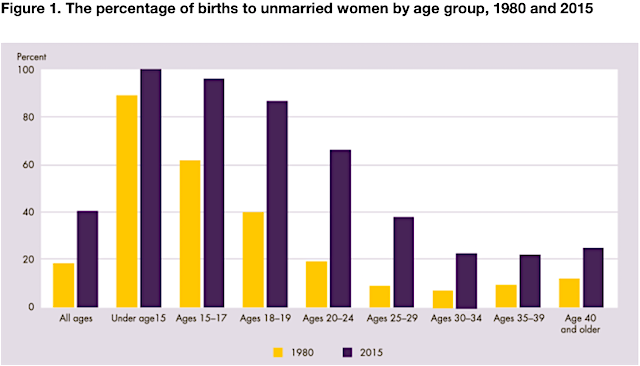OCTOBER 31, 2017 Institute for Family Studies
Bill Gates Overlooks the Vital Role of Families in Shaping Children’s Academic Outcomes
Highlights
- When it comes to teaching students the importance of waiting until marriage to have children, there is silence.
- Educators must recognize our necessary role in forging the consensus that families matter.
Editor’s Note: This essay is reprinted with permission from the Thomas B. Fordham Institute. Read the original article here.
When Bill Gates speaks about priorities, people listen. When he omits speaking about what should be priorities, people listen even more.
During my one year as the Deputy Director of Postsecondary Success at the Bill & Melinda Gates Foundation, my colleagues and I often talked about the “Gates effect”—the extraordinary influence that the foundation’s goals and grants wield with policymakers, philanthropists, researchers, K–12 practitioners, and virtually every institution that is trying to improve outcomes for kids.
That’s why it is important to read “Our Education Efforts Are Evolving,” a transparent and powerful essay by Bill Gates. He shares what he and his wife Melinda have learned since they and the Gates Foundation became involved in education reform in 2000, and delivers a five-pronged plan for the foundation’s future. Gates bemoans the fact that “schools are still falling short on the key metrics of a quality education,” and laments the persistence of the same disparities in achievement and postsecondary success for children of color and low-income students that motivated their action two decades ago.
The niggling question is why progress has been so meager despite the Gates Foundation’s billions of dollars of investment, as well as the enormous time and money spent by other foundations, philanthropists, and local, state, and federal governments—all no doubt influenced by Gates’s strategies to improve educational outcomes for kids.
Undaunted and still impatiently optimistic, however, the Gates Foundation expects to invest close to $1.7 billion in U.S. public education over the next five years. Unfortunately, the vision on which it is based and that Gates illustrates in his essay overlooks the vital role that families play in shaping the academic outcome of America’s children, and what schools might do to help their students form strong families as adults. Indeed, neither “parent” nor “family” are among the essay’s 3,000 words.
This lack of expectation of parent accountability is weird coming from a foundation that’s done so much to usher in the era of school accountability. And it’s simply stunning considering the foundation’s legendary and deserved reputation for expertly using data to inform its policies and find the true causes of the ills it tries to remedy.
 Five decades ago, the enduringly relevant Coleman report established the primacy of family structure and stability in driving educational outcomes for children. At the time of that publication, 6 percent of American children were born to unmarried women. Since then, that number has skyrocketed, especially among women and men under the age of twenty-five. (See figure 1.) According to a recent CDC report, 2016 was the tenth consecutive year that 40 percent of American children of all races were born outside of marriage.
Five decades ago, the enduringly relevant Coleman report established the primacy of family structure and stability in driving educational outcomes for children. At the time of that publication, 6 percent of American children were born to unmarried women. Since then, that number has skyrocketed, especially among women and men under the age of twenty-five. (See figure 1.) According to a recent CDC report, 2016 was the tenth consecutive year that 40 percent of American children of all races were born outside of marriage.

Source: “Births to Unmarried Women,” Federal Interagency Forum on Child and Family Statistics,
retrieved October 26, 2017.
Indeed, in the 17 years the Gates Foundation has been investing in education, more than an estimated 15 million babies of all races were born nationwide to unmarried women under the age of twenty-five. And, based on 2015 data, almost half of these children were born to unwed mothers with multiple children—an almost certain recipe for poverty, stress, and poor educational outcomes for the single mom and (typically) her children.
This “new normal” of permanent, staggeringly high nonmarital birth rates is a catastrophe for our country. And it’s an overwhelming challenge for those of us who have the responsibility to educate children whose disadvantage begins in utero and multiplies before they step foot into a preschool classroom.
Of course, there are extraordinary single parents whose children defy the gargantuan odds against them and succeed in life. Similarly, the child of a low-income couple in stable marriage is not guaranteed a ticket out of poverty.
So, there are always exceptions, but the data are clear on the myriad difficulties facing these kids. Children from poor, unstable families led by unmarried young women and men are, for example, more likely to suffer cognitive impairments as infants, to be chronically absent in elementary school, and to have repeated disciplinary issues. And they’re much less likely to attend an effective preschool and read proficiently by third grade.
 Consider, too, the work of Dr. Kathy Edin, who has studied low-income couples for decades. Due to a high degree of what she terms “re-partnering,” she’s found that more than half of children born to single parents will see their moms or dads form up to four or more romantic relationships during the child’s first five years of life. Many of these young people lack good education and aren’t ready emotionally, financially, or otherwise to raise a child. And far too many of the young men involved—themselves facing unemployment challenges—seem to be in a state of perpetual adolescence.
Consider, too, the work of Dr. Kathy Edin, who has studied low-income couples for decades. Due to a high degree of what she terms “re-partnering,” she’s found that more than half of children born to single parents will see their moms or dads form up to four or more romantic relationships during the child’s first five years of life. Many of these young people lack good education and aren’t ready emotionally, financially, or otherwise to raise a child. And far too many of the young men involved—themselves facing unemployment challenges—seem to be in a state of perpetual adolescence.
Mr. Gates’s failure to mention a strategy for educators to help stop the creation of fragile families is therefore a serious oversight worthy of critique. But it’s also a distressingly common problem in education policy, in which reform leaders like Mr. Gates rarely cite family fragmentation as a central contributor to the poor longitudinal outcomes of the charter sector.
Ironically, these same reformers regularly rise up against whack-a-mole crises like the NAACP’s mystifying opposition to charter schools, or Randi Weingarten’s absurd demonization of school choice, or the latest kerfuffle with celebrity hypocrite Matt Damon. But the reality is that these passing hullabaloos are nothing compared to the damage done by fragile families—a force that ceaselessly trudges forward, perpetuates poverty and achievement gaps, and severely hampers the children’s chances to lead a better life.
My point is not that Mr. Gates and other education reform leaders should present family breakdown as an excuse for the education system’s lack of progress. Far from it. The question is whether schools could be doing something to help their students form strong families as adults—to avoid perpetuating the cycle of fragile families and intergenerational poverty. And the clear answer is “yes.” Educators can teach students the sequence of life choices—education, work, marriage, then children—that is highly correlated with economic and life success, and that would empower students to overcome substantial race- and class-based institutional barriers.
To read the balance of this article CLICK HERE
Ian Rowe is a senior visiting fellow at the Thomas B. Fordham Institute and the CEO of Public Prep.
Editor’s Note: The views and opinions expressed in this article are those of the author and do not necessarily reflect the official policy or views of the Institute for Family Studies.
If you plan to teach your own child to read, we hope you will investigate the long-time favorite of families, especially of Homeschool families, Alpha-Phonics. Proven for over 37 years by tens of thousands. If you have any doubts about being able to teach your OWN Child to read please read why Alpha-Phonics works so very well. YOU CAN DO IT !! It is all explained below:


 Alpha-Phonics
Alpha-Phonics The Alphabet Song!
The Alphabet Song! Water on the Floor
Water on the Floor Alpha-Phonics the Book on CD Rom
Alpha-Phonics the Book on CD Rom Blumenfeld Oral Reading Assessment Test
Blumenfeld Oral Reading Assessment Test How To Tutor
How To Tutor How To Tutor Cursive Handwriting Workbook
How To Tutor Cursive Handwriting Workbook